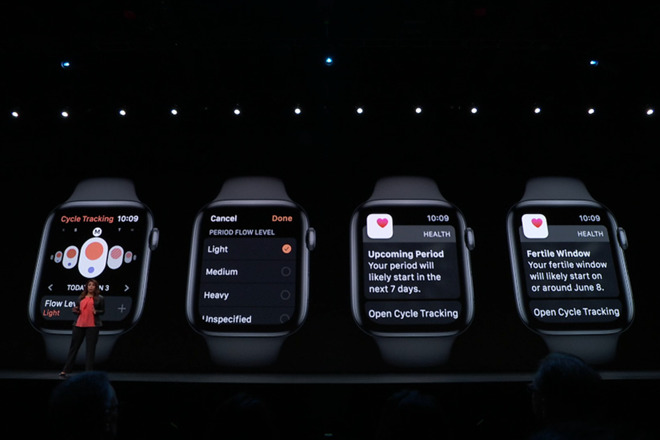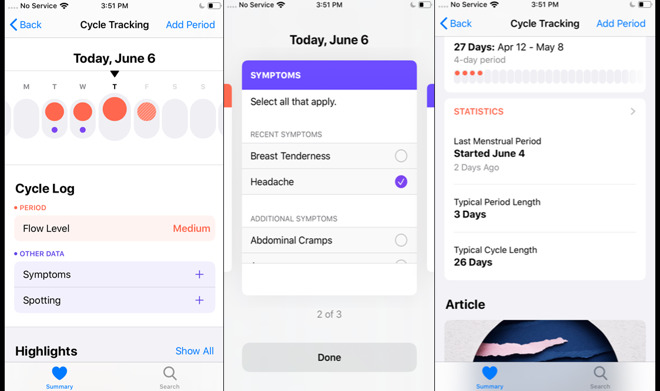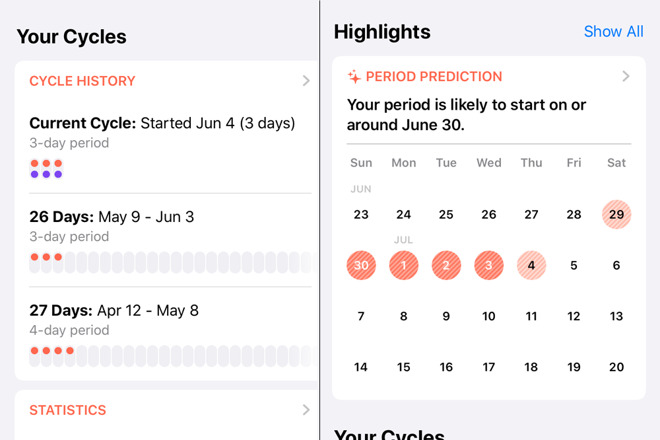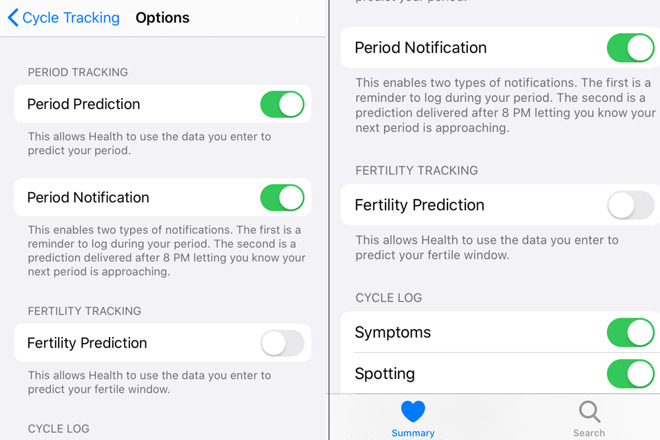Hands on with Cycle, Apple's new menstrual cycle tracker in iOS 13 [u]
Announced at the WWDC keynote, Apple has once again expanded its health monitoring and tracking on the Apple Watch. A big addition that arrived with the first beta is menstrual period tracking with Cycle.

Cycle is likely something that has been a long time coming, as Apple continues to expand the health tracking capabilities of both the Health app, as well as the Apple Watch.
Apple's implementation of Cycle as seen in the Apple Watch Series 5, and earlier models, has a pared down, minimalist theme like the rest of Health's metrics. It makes no assumptions about why someone would be tracking their cycle, nor is it something that is terribly apparent if you need to glance at the app in public.

It's also incredibly easy to understand Cycle from the second you start using it. It uses straight-forward, plain language to avoid any confusion about what may be going on. There is currently an article within Cycle called "Understanding Your Menstrual Cycle," which gives a brief run-down of any questions a user may have about their body, perfect for younger users who may still be getting used to the routine.
There's lots to track in Cycle as well, such as breast tenderness, headaches, and acne. If you're someone who experiences a lot of symptoms during PMS, your period, or ovulation, you can track them through Cycle. This is especially convenient for those who may experience pain, or have period-related complications from other health conditions, and allows users to prepare in advance.

Users can also opt in to Cycle's two push notifications. The first is a reminder notification that tells users to make sure they keep their log updated. The second is a reminder that happens the evening before a users period is set to begin.

Cycle can also help users estimate when they are ovulating, giving users a greater chance at successfully becoming pregnant. We anticipate that there will be more third-party devices that will be able to write data to Health and will help users more accurately track ovulation with Cycle.
If a user has previously used a period tracking app that wrote data to Apple's Health -- such as Clue or Glow -- Cycle will already be able to populate a backlog of the users cycles into itself. This means that Cycle will already have enough information to accurately predict any reasonably regular user's cycle.
Overall, we're very impressed with Cycle and the thought that Apple has put into it. We anticipate that it will be come many people's primary tracker. We'll be looking at it more, including Apple Watch integration, as the beta cycle was on.
Update June 19 11:57 P.M. Eastern Time: Video added

Cycle is likely something that has been a long time coming, as Apple continues to expand the health tracking capabilities of both the Health app, as well as the Apple Watch.
Apple's implementation of Cycle as seen in the Apple Watch Series 5, and earlier models, has a pared down, minimalist theme like the rest of Health's metrics. It makes no assumptions about why someone would be tracking their cycle, nor is it something that is terribly apparent if you need to glance at the app in public.

It's also incredibly easy to understand Cycle from the second you start using it. It uses straight-forward, plain language to avoid any confusion about what may be going on. There is currently an article within Cycle called "Understanding Your Menstrual Cycle," which gives a brief run-down of any questions a user may have about their body, perfect for younger users who may still be getting used to the routine.
There's lots to track in Cycle as well, such as breast tenderness, headaches, and acne. If you're someone who experiences a lot of symptoms during PMS, your period, or ovulation, you can track them through Cycle. This is especially convenient for those who may experience pain, or have period-related complications from other health conditions, and allows users to prepare in advance.

Users can also opt in to Cycle's two push notifications. The first is a reminder notification that tells users to make sure they keep their log updated. The second is a reminder that happens the evening before a users period is set to begin.

Cycle can also help users estimate when they are ovulating, giving users a greater chance at successfully becoming pregnant. We anticipate that there will be more third-party devices that will be able to write data to Health and will help users more accurately track ovulation with Cycle.
If a user has previously used a period tracking app that wrote data to Apple's Health -- such as Clue or Glow -- Cycle will already be able to populate a backlog of the users cycles into itself. This means that Cycle will already have enough information to accurately predict any reasonably regular user's cycle.
Overall, we're very impressed with Cycle and the thought that Apple has put into it. We anticipate that it will be come many people's primary tracker. We'll be looking at it more, including Apple Watch integration, as the beta cycle was on.
Update June 19 11:57 P.M. Eastern Time: Video added



Comments
It comes down to -- who do you trust? I personally trust Apple, its values, its business model, its privacy techniques, and its security practices. In all the years of iTunes use I've never been compromised. From what I see every year on their commitment to privacy, I don't see reason to start worrying now. If you are, don't use it.
The article AI ran about developer reactions to the new Sidecar is a useful instruction guide on how to deal with that possibility like an adult, especially from James Thompson of PCalc.
Did you know Apple also makes (gasp) a word processor?! What ever will the makers of Bear and Bean and Mariner Write and Drafts and Simplenote and Byword and Writeroom and GrowlyWrite and Microsoft and OmmWriter DO?? Surely, they are doooooomed!
Oh yeah, they'll differentiate and carry on, that's what they'll do.
To drag this back on topic, I'm rather dumbfounded that the majority of comments on this thus far are about how this "sherlocks" paid apps and discourages developers from creating independent apps, rather than expressing delight that an important component of women's health is being focused on by Apple and made accessible to all iPhone owners ... funny how this didn't come up with wrt to Health prior to now ...
...even the field for loading of contact photos into contacts (by others) and then synching with iCloud has been a concern - Apple presumably has all this data, personal images volunteered by others without permission innocently enough, encrypted or not and under Apple control, at least for now...
I would have preferred a distributed cloud option on local apple server software for 'in house' local storage, although there are of course pros and cons to that as well...
...is it all at least potentially subversively sinister in both design and execution...?
...you ask 'who do you trust...?' Apple is a for profit corporation in the USA governed by the Patriot Act and a rather unprecedented governance at the moment. Does that even deserve further qualification on the 75th anniversary of D day...?
About the number of people on the planet - look at countries where Apple has high market share and tell us what the natural population growth levels are. Close to zero or less I would guess.
• Mood rings are novelty or woo, and they serve no practical purpose other than maybe being pretty. Menstrual cycle tracking is an actual medical/health practicality that many women appreciate being made easier. Learn the difference between woo/novelty rings and women’s biology. EDIT: Actually, learning about women’s health is highly recommended so that you are informed enough not to vote for ignorant politicians, let alone if you want to have a long term sexual PARTNERSHIP with a woman. Human biology is interesting and important to understand to at least a basic degree (something that seems to be a huge problem in American governance).
• What “potentially broad and obvious privacy considerations” are you suggesting? Far more sensitive data is already being stored on devices than your menstrual cycle. Er, a woman’s menstrual cycle. Not being a woman myself, I cannot speak for how private they might feel this data should be (I will have to ask the women I know, although one of them already uses a third party tracking app, so that suggests to me that it’s not a big deal to her). However, every woman is an individual, so it doesn’t mean much what my collection of friends’ opinions are. Clearly it is an individual’s choice to use this feature or not. The health app already has privacy baked into it and for the largest scope of overall health data it can collect and, my understanding is, that Apple has worked with the appropriate government agencies to ensure they fall within the legal requirements for health information privacy control.
• What the hell do you mean with “liability for dating apps”?? You do realize that, if you’re talking about having sex with women on dates, it is YOUR RESPONSIBILITY to discuss with them the appropriate issues (STIs and birth control, plus what they and you expect) before having sex, right? You do know about condoms and sex acts that don’t cause pregnancy, right? You do know that the entire onus of responsibility is not on your partner alone, right?
• “We” seem to want more and more people, perpetually. This is a cultural problem. I do not think we should keep breeding at this rate, but no one listens to me. Myself and nearly every one of my friends and companions have long ago decided we never wanted to reproduce and have had to suffer constant nagging and opinions by others about how we “will change our minds, eventually”. Well, we haven’t. This menstrual cycle tracking feature is mostly irrelevant to this topic. Yes, women can use it to help find the best times to attempt to become pregnant, and NO: I don’t recommend using menstrual tracking to predict when it’s “safe” to have sex, because bodies are imperfect. Try the copper IUD instead because there are no hormones in it to mess with your body. The tracking method is unreliable (speaking from personal experience with my own companion and the reports of other women I know who’ve tried it and gotten pregnant anyway).
• “The most intimate and personal fundamental aspects of human biology”...??? Seriously? Are you saying that the menstrual cycle is “the most important and personal” type of health data compared to all the other health data? That seems a bit of a stretch to me, but, again, I’m not a woman. Maybe you should consult some actual women. There don’t seem to be many on this forum commenting on Apple news topics. Maybe we should invite some in to consult them (and then proceed to act like sane people and not treat them creepily, because tech geeks tend to do exactly that).
• “Frog boiling” - This sounds a bit like paranoia and luddism. Human culture has repeatedly had segments of panicked and paranoid luddites who think the next convenience will doom us all in some way or another. I’m not seeing it in this context. Yes, we are putting more and more of our information into ONE basket, and that has inherent risks of exposure of ALL data in the event of breach. We still have the freedom to NOT USE our computing devices for this data, or not use them in ways that store that data in places not under our control. EDIT: we do NOT have as much control when we go to the doctor or a hospital. Read the HIPA and policy forms and see what happens when you disagree with terms (you can hypothetically treat it like a contract by striking or adding things, initialing the changes, etc, but I don’t think this has ever been tested in court). This is not an issue isolated to iPhones and Apple services.
• If there’s a hack of data, the data is encrypted. If there’s an EULA change that makes all of this data suddenly free, I suspect that there would be vast legal consequences for Apple, especially under the laws guiding health information and consumer trust. You see how often Apple gets sued. It would be a big deal. Users as cattle is not Apple’s business model. They are somewhat unique in this aspect and they are using that uniqueness to differentiate themselves. It does matter to people. I suspect it would take a major corporate culture shift and CEO change for Apple to dive into the users as cattle model, and I believe many of their current customers would think twice, or abandon Apple, if such a change were made.
On the other hand, for the mildly stressed doesn’t Apple make some kind of “breathing”/meditation app?
Oh, yeah... here it is: https://gizmodo.com/is-apple-s-new-meditation-app-more-full-of-shit-than-de-1781906778
And no, menstrual cycle tracking isn’t like a mood ring.
Betterridge’s Law appllies to Gizmodo’s headline:
https://en.wikipedia.org/wiki/Betteridge%27s_law_of_headlines
...no, deep breathing isn’t full of shit and does lower stress. From their own article:
”According to the research of Jonathan Palley and Neema Moraveji at Stanford’s Calming Technology Lab, the techniques can be helpful. After seven years of studying the benefits of deep breathing, Palley and Moraveji have concluded that slow, purposeful breathing can indeed lower blood pressure and increase endorphins.”
Apple’s app is Breathe, to do exactly that, and not “meditate” as Gizmodo calls it. Not sure if they’re still pissed about the iPhone 4 leak and repercussions, but their story is a hit piece.
I'm glad AI was able to find a woman to write an informative and meaningful piece to explain this interesting app.
Sorry, but no, been on this and other tech sites long enough to see the pattern — extreme discomfort and disdain from guys when there is talk about gurls in the clubhouse.